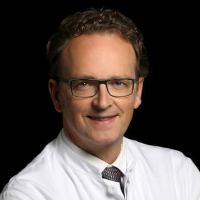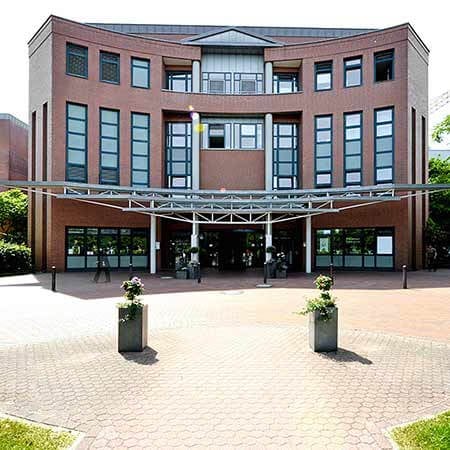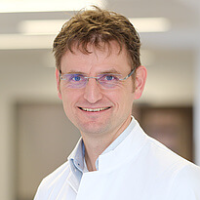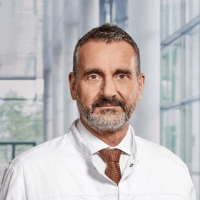Tricuspid Commissurotomy for Tricuspid Valve Stenosis treatment in Germany
Treatment prices are regulated by national law of the corresponding countries, but can also include additional hospital coefficients. In order to receive the individual cost calculation, please send us the request and medical records.

Department of Cardiothoracic Surgery
According to the Focus magazine, the Department of Cardiothoracic Surgery ranks among the top German medical facilities specializing in the surgical treatment of diseases of the cardiovascular system and lung cancer! The department offers the full range of surgical services for the treatment of diseases of the cardiovascular system, respiratory tract, including heart and lung transplantation, artificial heart implantation. The therapeutic options include aortic surgery, coronary artery bypass grafting, transplantation surgery, surgical treatment of heart rhythm disorders (arrhythmias), minimally invasive surgery, surgical treatment of the heart valves, including reconstructive interventions. All operations are performed using state-of-the-art technology and in accordance with the current recommendations of professional societies.






Department of Cardiac Surgery
The Department of Cardiac Surgery provides a full range of surgical treatment in its area of specialization. Special emphasis is placed on heart valve repair and replacement surgery, coronary artery bypass grafting, thoracic aortic surgery, adult congenital and acquired heart disease surgery, pacemaker and defibrillator implantation, and artificial heart implantation for severe heart failure. Many heart operations are performed using minimally invasive techniques, which has a positive effect on the healing of the surgical wound. Minimally invasive cardiac procedures also reduce surgical risks and contribute to a rapid recovery of the patient in the postoperative period. Surgical treatment of cardiac pathologies is performed in advanced operating rooms equipped with the latest technology. The cardiac surgeons of the department successfully perform routine and complex surgical procedures, saving the lives of thousands of patients. The specialists work in accordance with current clinical protocols and follow the recommendations of the German Society for Thoracic and Cardiovascular Surgery (DGTHG).


Department of Cardiothoracic Surgery and Vascular Surgery
The Department of Cardiothoracic Surgery and Vascular Surgery provides effective surgical treatment for diseases of the heart, respiratory system, and blood vessels. The team of cardiac surgeons operates on patients with heart valve pathologies, coronary heart disease, heart failure, and heart rhythm disturbances. In the field of thoracic surgery, the key focus is on the surgical removal of lung tumors and lung metastases. The specialists in this area also perform surgery to repair chest wall deformities. In the field of vascular surgery, interventions for abdominal and thoracic aortic aneurysms are most often performed here. The department's vascular surgeons are also exceptionally competent in the treatment of peripheral occlusive arterial disease. A great advantage for the department's patients is that almost all surgical interventions are performed using minimally invasive techniques, so there is no need for a long postoperative recovery. The department's operating rooms are equipped with state-of-the-art technology. This allows for effective and safe treatment. The priority is always personalized medical care for patients.






Tricuspid valve stenosis is a rare heart disease, predominantly of rheumatic etiology, due to which the orifice between the right atrium and the ventricle becomes too narrow. When the heart contracts, for blood it is difficult to pass into the ventricle, so the right atrium experiences a high load. Tricuspid stenosis can sometimes be combined with insufficiency. Even in such cases, doctors at hospitals in Germany successfully eliminate this heart disease with surgery. You are welcome to visit the Booking Health website to find the cost of treatment in Germany and choose the most suitable medical care program.
Content
- What are the causes of tricuspid valve stenosis development?
- Diagnostics
- Who may be a candidate for treatment?
- How is tricuspid valve stenosis treated?
- What is a commissurotomy?
- Why is it worth undergoing treatment in Germany?
What are the causes of tricuspid valve stenosis development?
In the vast majority of cases, tricuspid valve stenosis develops due to rheumatism. This is an autoimmune complication of a streptococcal infection, such as a sore throat. Heart disease is very rare in developed countries but is still common in countries with poor medicine due to the lack of adequate prevention for rheumatic fever.
Features of the heart defect:
- stenosis and insufficiency can coexist;
- the disease progresses rapidly while the inflammatory process in the heart continues;
- other heart valves, aortic and mitral ones, are often affected as well, while isolated tricuspid stenosis is very rare.
Tricuspid valve stenosis very rarely develops due to other causes, such as heart tumors, bacterial endocarditis, or Whipple's disease. The valvular apparatus can be damaged by large blood clots located in the right atrium. There is also a congenital variant of this heart disease.
Diagnostics
Hospitals in Germany use the most advanced equipment for the diagnostics of heart valve defects. This equipment also allows doctors to establish the presence of stenosis or insufficiency, the severity of the disease, the effect on hemodynamics, the condition of the heart chambers, and the presence of concomitant heart valve defects.
High-quality diagnostics help doctors to best plan treatment. Based on diagnostic results, doctors receive answers to a number of important questions: does a person need any treatment, should a surgical intervention be performed only on the tricuspid valve or also on other valves, what kind of treatment will this be (prosthetics or various options for heart valve repair).
Echocardiography is considered the main method for heart imaging. Doctors study the condition of the heart valves and chambers of the heart. They can measure the area of the heart valve, detect regurgitation (blood return), and assess the degree of remodeling of the right ventricle.
Cardiac CT and MRI scans are more accurate methods for visualizing heart valves. They can be used when a doctor has not managed to obtain all the information necessary to make a decision regarding the patient's treatment with ultrasound scanning.
Stress testing can be used to reveal hidden symptoms that can only manifest themselves with physical or pharmacological stress.
Electrocardiography can be used to assess heart rate. The presence of heart arrhythmias associated with changes in the structure of the right atrium and ventricle is an argument in favor of surgical treatment.
Chest X-ray helps to detect the accumulation of fluid in the pleural cavities due to severe malformations.
Cardiac catheterization is an invasive diagnostic procedure that requires the insertion of a catheter into the large blood vessels of the heart. This procedure can be carried out if the pressure in the pulmonary artery exceeds the systemic one by 50% or more. The main goal is to detect pulmonary hypertension.
Coronary angiography is an X-ray assessment of the state of the arteries that provide blood supply to the heart muscle. Doctors at hospitals in Germany conduct this procedure during the preparation for the surgical repair of heart defects in patients with coronary heart disease, risk factors for this disease, all men over 45 years old, and women over 50 years old.
Who may be a candidate for treatment?
Isolated tricuspid stenosis is usually not dangerous. At an early stage, this condition may not even be actively treated since the disease rarely leads to any complications.
This heart disease, however, is rarely isolated. When combined with rheumatism, the condition progresses even more rapidly and eventually causes symptoms such as shortness of breath, liver enlargement, and fatigue. Many patients develop arrhythmias since the right heart, where the main pacemakers are located, is affected. In severe cases, the volume of the abdomen increases due to the accumulation of fluid, the neck veins swell, and the legs swell.
The severity of the disease is determined depending on the area of the heart valve orifice. In the case of grade 1, 2, and 3 heart disease, the area decreases to less than 3.5 cm2, 3 cm2, and 1.5 cm2, respectively.
Indications for the treatment of tricuspid valve stenosis are as follows:
- grade 3 stenosis;
- stenosis of any grade that causes any clinical symptoms (if other causes of their development are excluded);
- grade 2 stenosis, if it is combined with other heart valve defects requiring surgical repair (in this case, a doctor treats all heart defects during a single operation).
Right ventricular remodeling is considered an argument in favor of surgery, but in the absence of other indications, doctors may use only medical supervision.
How is tricuspid valve stenosis treated?
Doctors at hospitals in Germany treat tricuspid valve stenosis with the following types of heart surgery:
- reconstructive (aimed at heart valve repair): commissurotomy, leaflet augmentation, balloon valvuloplasty, and one-and-a-half ventricle repair;
- prosthetics.
Whenever possible, doctors at hospitals in Germany seek to repair the heart valve. If this is not possible, heart valve replacement surgery will be performed.
Heart valve repair surgery provides better hemodynamic parameters. In addition, its results are more long-lasting.
Only biological prostheses can be implanted in the position of the tricuspid valve, since mechanical ones often lead to the formation of blood clots, even if a person is constantly taking anticoagulants. Bioprostheses, however, have a limited service life and after 10-20 years they have to be replaced.
Since tricuspid valve stenosis is predominantly rheumatic in its origin, many patients suffer from this condition at a young age. This means that they will have to undergo several heart operations during their lifetime. But with high-quality heart valve repair surgery, the effect will be more long-term. It is possible that it will last a lifetime and that no surgical intervention on the heart will be required even after decades.
What is a commissurotomy?
A commissurotomy is a surgical procedure to dissect the heart valve leaflets, which coalesce due to rheumatic inflammation. This causes the orifice of the tricuspid valve to narrow. After dissection, the leaflets can move normally again and open completely when blood passes through the right atrioventricular orifice.
Commissurotomy is an open heart surgery performed with the use of a heart-lung machine. The therapeutic effect is achieved by restoring mobility and increasing the contact area of the heart valves.
Sometimes, commissurotomy can only be one of the stages of the intervention during the operation, and a patient additionally requires other manipulations on the tricuspid valve. Since commissurotomy is mainly performed for heart disease of rheumatic origin, doctors at hospitals in Germany often have to close defects in the heart valve leaflets with a patch to eliminate the phenomenon of valvular insufficiency and also to strengthen the fibrous ring.
Whenever required, operations on other heart valves can be performed simultaneously since rheumatism often causes their multiple lesions. Commissurotomy is most often combined with aortic valve replacement, mitral valve repair or replacement.
Here are some possible outcomes of commissurotomy:
- if you choose to have your treatment in Germany, the most common option is to have your heart disease completely cured forever;
- if the rheumatic disease is not cured or controlled by drugs and the heart inflammation persists, stenosis will recur;
- a patient will develop tricuspid valve insufficiency in the case of excessive dissection of the heart valve leaflets.
Why is it worth undergoing treatment in Germany?
You can expect top-class medical care in the field of heart surgery at hospitals in Germany. German doctors successfully perform operations of any complexity. There are a few reasons for you to undergo your treatment in Germany. These are as follows:
- state-of-the-art Cardiac Surgery Centers;
- the latest modifications of surgical operations to reduce the risk of complications and improve the results of the intervention;
- experienced cardiac surgeons with high authority around the world;
- the tricuspid valve can be successfully repaired even in severe cases, including those with a combination of heart valve stenosis and insufficiency;
- a low risk of heart valve insufficiency after a commissurotomy;
- low patient mortality rates – they are 3-4 times lower than at hospitals in countries with a low level of medicine than at the best hospitals in Germany;
- two or three heart valves can be repaired simultaneously;
- several heart diseases can be treated simultaneously at once, for example, heart valve defects and coronary heart disease;
- low cost of treatment compared to other developed countries (USA, Canada, Japan, UK, etc.).
Doctors in the Departments of Surgery at hospitals in Germany use early rehabilitation protocols. They help patients not only to recover faster after surgery but also to further reduce the risk of complications. In addition, the time spent at the hospital is reduced, and after discharge from the Department of Surgery, patients can return to their normal lives faster.
You are welcome to visit the Booking Health website if you want to undergo your treatment abroad. Our website offers the best hospitals in Germany. On the Booking Health website, you can find the exact cost of treatment in Germany at various medical centers, compare prices, and choose the most suitable option. The Booking Health employees will help you to choose a hospital that has extensive and successful experience in the repair of tricuspid valve defects. When choosing a medical care program through the Booking Health service, the cost of treatment in Germany will be lower due to the absence of additional fees for foreign patients.
Authors:
The article was edited by medical experts, board-certified doctors Dr. Nadezhda Ivanisova and Dr. Vadim Zhiliuk. For the treatment of the conditions referred to in the article, you must consult a doctor; the information in the article is not intended for self-medication!
Sources:

